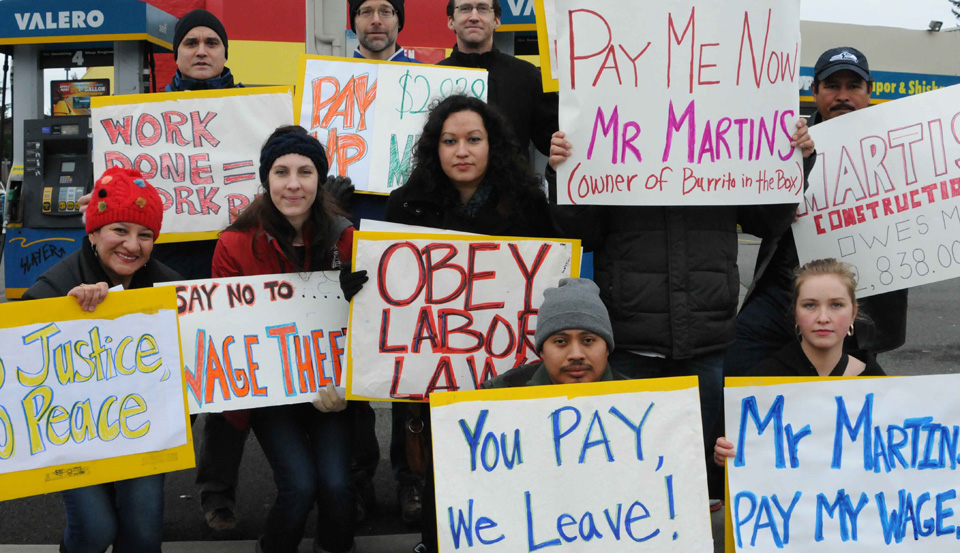
WASHINGTON — While Donald Trump continues to excoriate immigrants from South and Central America, the AFL-CIO is ramping up programs to help them unionize and gain political power.
A forum recently held here highlighted what the labor movement will be doing to provide Latina working women with the tools they need to win better standards of living and security for the future.
The key, the panelists agreed, is to encourage self-empowerment.
“Latina empowerment is important because nobody but us can tell our stories,” Montserrat Garibay of Texas’ EducationAustin said. EducationAustion is a local affiliated with both the NEA and the AFT.
Aside from Garibay, speaking at the packed AFL-CIO Las Trabajadoras forum here were Diana Ramirez of DC’s Restaurant Opportunities Center (ROC), Monica Ramirez of the Labor Council for Latin American Advancement (LCLAA) and Dora Cervantes, secretary treasurer of the Machinists union.
They agreed that Latinas are one of the most oppressed minorities in the country.
On average, women in the U.S. who work full time are paid 79 cents for every dollar paid to men. That’s bad enough, but federal data shows that Latina working women are paid, on average, just 55 cents for every dollar paid to white, non-Hispanic men.
Furthermore, Latinas, especially those who work in the restaurant industry, suffer wage theft, discrimination and sexual harassment on the job at rates higher than their non-Latina counterparts.
Unions can help overcome this exploitation by working with Latinas to combat a culture in which they are often urged to keep quiet and not speak up, panelists said.
Furthermore, unions can help Latinas gain empowerment by helping to guide them through the red tape needed to gain citizenship.
All the panelists said that most important, unions can help Latinas organize.
“Zero-point- one percent of restaurant workers are unionized,” said ROC’s Ramirez. Furthermore, restaurant workers, particularly servers, now make the so-called “tipped minimum” wage, of $2.13 an hour nationwide. It hasn’t risen in 25 years.
“It’s hard to organize them,” Ramirez said, “because of high turnover and low wages. If we stabilize the workforce, then there’s that much more opportunity to organize.”
Good for business.
To this end, ROC, a non-profit organization that advocates for restaurant workers in 10 major cities, runs workshops to train Latinas on how to advance from the back of the house – cooks, dishwashers, servers – to front-of- the-house posts, usually held by white men.
And ROC works to convince restaurant owners to empower their workers by paying a living wage.
ROC representatives show restauranteurs that raising their workers’ wages is good for business. Workers earning a living wage have lower turnover rates, higher morale and higher rates of efficiency than workers who are poorly paid.
Montserrat Garibay described the programs run by her union local.
The local trains teachers, bus drivers and classified school employees, to stand up for themselves, in anti-union, right-to- work Texas. “At EducationAustin,” Garibay said, “we want our members to be able to say ‘If I’m working overtime, pay me time-and-a- half,’ as federal law requires, and as Anglo school principals often refuse to do.”
She continued, “As a teacher, I cannot do my job fully if the cafeteria workers in my school are not treated with respect.” The cafeteria workers are mostly Latinas.
Political action
Garibay stressed that political action is needed, too. For example, she explained, at one time the Austin school board was dominated by anti-worker members. To combat this, EducationAustin gathered like-minded groups in a mass coalition to educate voters on how to change the board members to improve the schools.
It succeeded. Now seven of the nine board members are worker-friendly and student-friendly, Garibay said.
Her local also launched citizenship drives. The local’s leaders held classes instructing immigrants about how to answer the questions they would be asked by officials. Then the local raised funds to help Latinos and Latinas pay the $680 needed to obtain the documents required to become citizens and to pay the necessary federal fees.
The program succeeded, Garibay added, because the organizers looked like the people they served.
“That’s important,” she said. “The labor movement must find and encourage Latinas who are willing – and able – to take the time to learn how to stand up for themselves.”
Panelists agreed with Garibay that unions must identify Latinas with the characteristics of leaders, then educate them and then mobilize them to ascend to positions within and outside of the organized labor movement.
Cervantes, the IAM secretary-treasurer, spoke about political action.
“As the number of Latinas grows and we flex our muscle at the polls, politicians will need to deal with our issues – the harassment, the remarks, the B.S.,” Cervantes declared. “We have to say, ‘Basta!’ Enough!”
She also said that unions should do more to make the general public aware of the conditions under which Latinas work. She said “we must organize, handbill, and demonstrate around issues such as low pay, sexual harassment and the need for affordable child care.
“We need to take our campaign out on the streets, because we know the issues in here,” she added, gesturing to the pro-worker crowd. “But do they know out there?”

MOST POPULAR TODAY

‘Warning! This product supports genocide’: Michigan group aims to educate consumers

Ohio: Franklin County treasurer attends Netanyahu meeting, steps up Israel Bond purchases

“Trail of Tears Walk” commemorates Native Americans’ forced removal

After months of denial, U.S. admits to running Ukraine biolabs

Hold the communism, please: SFMOMA’s Diego Rivera exhibit downplays artist’s radical politics






Comments